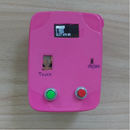Introduction: Use Raspberry Pi 3 As Router
According to Wikipedia, a router is a networking device that forwards data packets between computer networks. If we tear-down a wireless router, we will probably find an application specific processor that handles data packets and an RF segment that handles wireless connectivity.
You know what else has a processor and an RF segment.
THAT'S RIGHT a raspberry pi model 3. So in this miniProject, we will convert a raspberry pi to act as a router.
Step 1: Video
Take a look at video for quick comprehensive guide in 3 mins.
Step 2: Boot-up Raspberry Pi.
First step is to get your raspberry pi up and running. Official getting started guide on Raspberry pi website is best resource for this.
Go to next step once you have your raspberry pi up and running.
Step 3: Upgrading Raspberry Pi
First we will update package list available from repositories using
sudo apt-get update
Once done, we can install these latest packages using
sudo apt-get upgrade
This might take a while depending on your internet connection speed.
Step 4: Installing Hostadp and Bridge-utils
Once raspberry pi is upgraded.
we need to install a user space background process called hostapd, used for wireless access points and authentication servers. We will also need a package called bridge-utils to manage bridge devices.
sudo apt-get install hostapd bridge-utils
We need to turn off some of the new services that we just installed do it using
sudo systemctl stop hostapd
Debug- Some times raspbian will display message saying hostapd and bridge-utils not found for install command. Do not worry. Run 'sudo apt-get update' once more and it should get resolved.
Step 5: Disable DHCP Config for Wlan0 and Eth0
Now, we set dhcp background process not to automatically configure wlan0 and eth0 interfaces. We do this by putting following two lines
denyinterfaces wlan0 denyinterfaces eth0
at the end of /etc/dhcpcd.conf file, open it using.
sudo nano /etc/dhcpcd.conf
Step 6: Creating Bridge Br0
Next, we create a bridge br0 using brctl command which is an Ethernet bridge administrator
sudo brctl addbr br0
and using
sudo brctl addif br0 eth0
command we add eth0 as one of the ports for bridge br0.
Step 7: Edit /etc/network/interfaces
Now open up a file called interfaces in /etc/network directory
sudo nano /etc/network/interfaces
and add these five lines.
allow-hotplug wlan0 iface wlan0 inet manual auto br0 iface br0 inet dhcp bridge_ports eth0 wlan0
First line starts wlan0 interface on a hotplug event. Second line creates a network interface without an IP address which is normally done for bridge elements. Third line starts br0 interface on boot up. Forth line helps in automatic assignment of IP address to br0 interface using DHCP server and finally fifth line connects eth0 interface with wlan0. Save this file and close it.
Step 8: Edit /etc/hostapd/hostapd.conf
Next, we will configure our wireless access point, we can do this using a file called hostapd.conf in /etc/hostapd folder. Open it up
sudo nano /etc/hostapd/hostapd.conf
and paste these lines.
interface=wlan0 bridge=br0 ssid=miniProjects hw_mode=g channel=7 wmm_enabled=0 macaddr_acl=0 auth_algs=1 ignore_broadcast_ssid=0 wpa=2 wpa_passphrase=subscribe wpa_key_mgmt=WPA-PSK wpa_pairwise=TKIP rsn_pairwise=CCMP
Value assigned to ssid is the name that access point will use to broadcast its existence. Last five lines are focused on authentication and security of access point. Value of wpa_passsphrase is used as login password which is subscribe in our case. This is a link to document, where you can find definition of each variable that we have used here.
Step 9: Final Edit /etc/default/hostapd
Finally, open up hostapd file in /etc/default directory
sudo nano /etc/default/hostapd
uncomment DAEMON_CONF line and provide path to file we just created.
DAEMON_CONF="/etc/hostapd/hostapd.conf"
This completes setup for raspberry pi to act as router.
Step 10: Done
Now, power-on your raspberry pi with Ethernet cable connected.
You should see raspberry pi broadcasting ssid and access internet.
Thanks for reading.
Let me know if you face any issue while creating your own router.
Please vote for this instructable, if you liked it.





